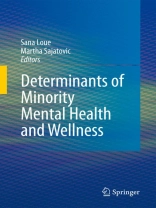The United States is experiencing a dramatic shift in demographics, with minorities comprising a rapidly growing proportion of the population. It is anticipated that this will likely lead to substantial changes in previously established values, needs, and priorities of the population, including health and mental health for individuals, families, and society at large. This volume focuses on determinants of minority mental health and wellness. This emphasis necessarily raises the question of just who is a minority and how is minority to be defined. The term has been defined in any number of ways. Wirth (1945, p. 347) offered one of the earliest definitions of minority: We may define a minority as a group of people who, because of their physical or cultural characteristics, are singled out from the others in the society in which they live for differential and unequal treatment, and who therefore regard themselves as objects of collective discrimination. The existence of a minority in a society implies the existence of a corresponding dominant group enjoying higher social status and greater privileges.
Inhaltsverzeichnis
Health and Wellness.- City Living and Mental Health in History.- Mental Health, Mental Health Courts, and Minorities.- Migration and Mental Health.- Media, Minorities, and the Stigma of Mental Illness.- Minority Mental Health and Wellness: A Perspective from Health Care Systems.- Social Support, Mental Health, Minorities, and Acculturative Stress.- Religion and Mental Health Among Minorities and Immigrants in the U.S..- Cultural Considerations Regarding Perspectives on Mental Illness and Healing.- Gender and Minority Mental Health: The Case of Body Image.- Family Determinants of Minority Mental Health and Wellness.- Family-Focused Psychoeducational Programs for Minorities with Serious Mental Illness.- Socioeconomic Status: Risks and Resilience.- Psychiatric Genetics-An Update.- Substance Abuse in Minority Populations.- Neurocognitive Testing of Minorities in Mental Health Settings.- Stress and Resilience.- Methodological Challenges in Research on the Determinants of Minority Mental Health and Wellness.
Über den Autor
Dr. Loue is known internationally for her research with minority communities, as well as research ethics and epidemiology. She is the Principal Investigator of a foundation-funded study examining the co-occurrence of mental illness and HIV risk among African-American men who have sex with men and an NIMH-funded study focusing on the cultural context of HIV risk among Latinas with severe mental illness. Dr. Sajatovic is a psychiatrist with significant expertise in mood disorders and an increasing research and clinical focus on the delivery of quality mental health care to minority populations.












